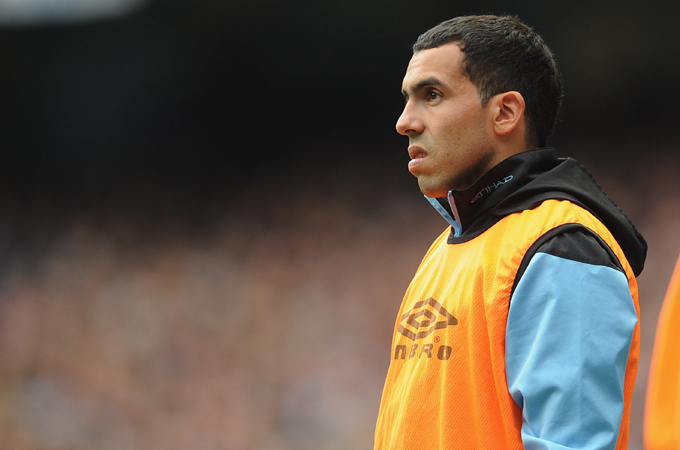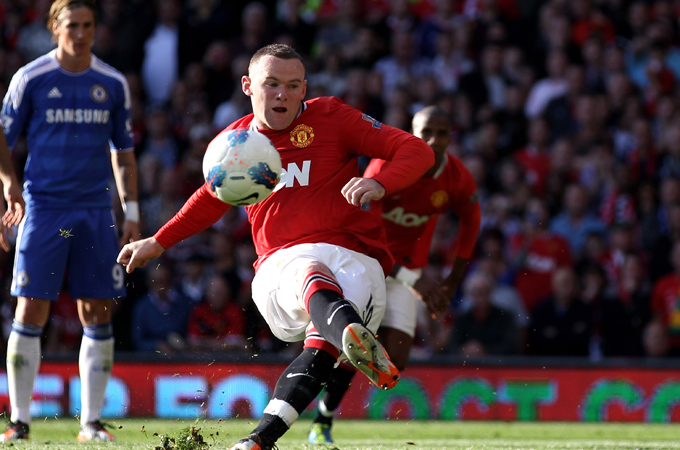Have footballers become society’s scapegoats?
Carlos Tevez is the latest footballer to have disgraced the game or maybe he is simply a frustrated man who is homesick.

 |
| Carlos Tevez has been through a difficult summer and his season is not going much better [GALLO/GETTY] |
Hardly a week goes by without hearing about a Premier League footballer’s indiscretion.
Sometimes it is infidelity… sometimes it is a night club scuffle… and sometimes, just sometimes, it is for something that went on inside a stadium.
Keep reading
list of 4 itemsRecord win against Chelsea moves Arsenal three clear in Premier League
‘Disgrace’: Ten Hag slams criticism over Man United’s FA Cup semifinal win
Inter win heated Milan derby to seal 20th Siere A title
In April, there was a huge furore when Manchester United’s Wayne Rooney passionately celebrated a goal by screaming a naughty word very loudly into the camera. The striker received a two game ban for his TV rant.
But that was not the only punishment dolled out to the player.
The media came down like a tonne of bricks on the striker for his outburst, one that would obviously ruin the reputation of the game and encourage more swearing up and down the land.
More recently, former United player Carlos Tevez was publicly, and hence globally, chastised for refusing to go onto the pitch during Manchester City’s Champions League clash with Bayern Munich.
Football managers, former players and media columnists were up in arms, “How very dare he”, they cried.
Again the morality of the game was under threat.
It seems nowadays that due to their large pay packets and worldwide fame and influence, we expect only the best behaviour from our football stars.
Unlike film and music idols – footballers get away with very little.
Vilified
While the stroppy and childish behaviour of Tevez did not send a positive message to football fans, the reaction to his behaviour does not either.
Footballers are now vilified for many of society’s evils for no other reason than they are high profile enough for us to know what is going on.
But, then again, do we really?
|
“We are quick to judge selfish Tevez for staying on the bench, disregarding that day we pulled a sicky leaving the burden to fall on our colleagues” Joanna Tilley |
What we saw on Tuesday was Tevez refusing to play for his team, we remain none the wiser about the context of the situation.
Perhaps Tevez has been treated in such a way by the club that makes his behaviour justified.
Even if Tevez is just a stroppy spoilt footballer does that mean his actions warrant our judgment?
We are quick to judge selfish Tevez for staying on the bench, disregarding that day we pulled a sicky leaving the burden to fall on our colleagues.
We berate footballers for moving club to get more money but back in the real world when our friends do it they are being sensible and progressing their career.
We criticise Rooney and Giggs for having affairs, when whoops, I totally forgot about my own one!
Regardless of inequalities in wealth and status between “us” and “them”, there should not be one rule for footballers and another rule for everyone else.
Wayne Rooney… Ryan Giggs…Carlos Tevez… more and more footballers seem to be facing the full force of our disgust. Or, perhaps, jealousy.
No moral compass
Since when did footballers become a moral compass to guide us through life in a wholesome and sensible way.
Today United goalkeeper David de Gea made the front page of the English Sun newspaper for reportedly stealing a £1.15 doughnut.
Stealing is wrong but is it any worse when a footballer does it?
Surely far more worrying than de Gea’s wandering hands, is that this story is making the front page of the UK’s biggest selling newspaper.
“Can there be a group of people which is greedier, more selfish, more out-of-touch and even richer than bankers?” asks Stephen Glover in the Daily Mail.
 |
| Rooney has managed to get back to his best on the pitch despite the media pressure [GALLO/GETTY] |
The answer is we do not know because less people care about how heads of financial institutions behave in and out of work.
And I would predict, if we did know, it would not make us any more proud of humanity.
Another gripe people have with footballers is the amount of money they earn.
However, although they are incomprehensible sums, footballers earn every penny they get paid and probably even more.
Football is an invaluable industry with the kind of popular support and passion money cannot buy.
The importance of football in uniting the UK is immeasurable. Instead of uniting in crime many unite to play football or support their local team.
If we choose to go along with the theory that footballers are all good for nothing, spoilt, rich primadonas then we must wonder why journalists spend so many pages writing about them?
Many tabloids lap up these “footballer doing wrong” stories, splashing the face of the culprit on the front page. Surely condemnation on the back of such glorification is hypocritical.
The sad fact is that journalists know they can make money from people’s inherent curiosity about the bad things other people get up to, and at the moment they are using Premier League footballers to cash in.
While it no bad thing that footballers are kept in check by the media, it is unfair to assume they are worse than any other rich, pumped-up and testosterone filled section of the population.
We need to stop lashing out at individual footballers who have done little to justify such scathing attacks.
We need to stop putting their affairs and pitch-side strops on the front page and then asking what ten football nobodies have to say about it.
“He is a disgrace to the game”, “He should never play in a City shirt again”, “The sooner he is out the country the better” – these inane sound bites are insulting, simplistic and rude.
We should try to be more positive towards our footballers because we owe them a lot and their job, whatever people may say, is not easy and does make a valuable difference.
Joanna Tilley is a journalist freelancing with Al Jazeera on the Sport website. She has worked at Sky News, Sky Sports News, LBC Radio, Sportasylum.com, TNT Down Under and Wanderlust magazine. Follow her on Twitter (@joannatilley) or her website, sportjostyleeee.blogspot.com.
Al Jazeera is not responsible for the content of external websites.